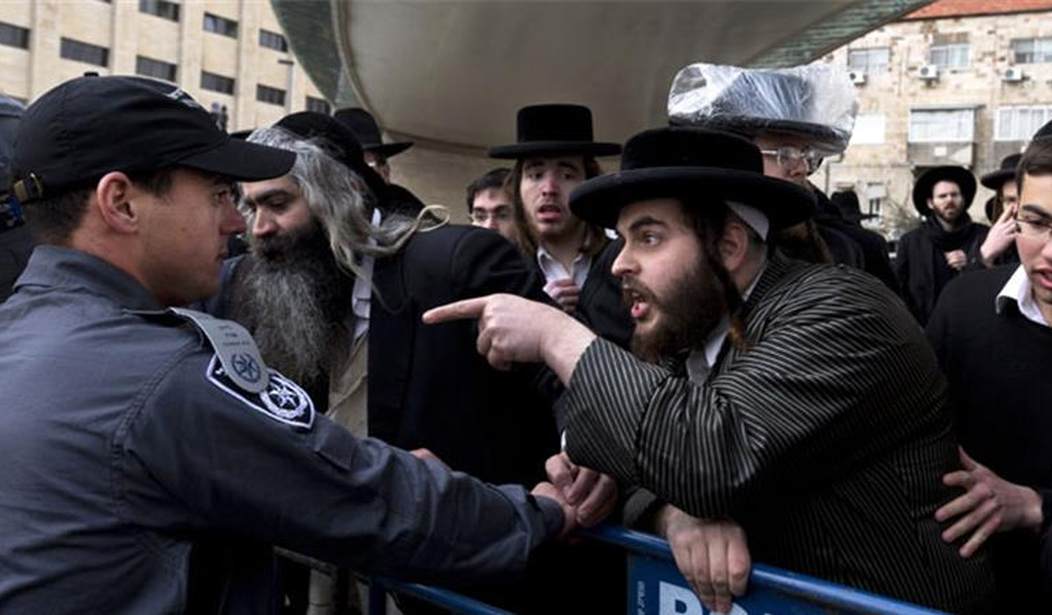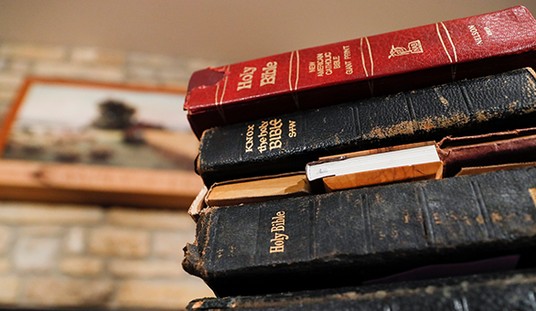Those who follow the news in Israel will have noted the reports of sporadic demonstrations in the country by Jews identifiable by their dress as “chareidim” — that is, seriously Orthodox Jews — against the draft law which was passed in 2014.
For instance, on a recent trip to Israel, my wife witnessed a demonstration by hundreds of men in the city of Bnei Brak blocking Chazon Ish Street, a main thoroughfare linking that city with the nearby suburb of Ramat Gan, in protest over a young man who was arrested for resisting the draft.
The situation has become so bad that more extreme elements identified with that community are engaged in a campaign of shaming young chareidi men who comply with the law, calling them in posters and protests “chardaqim” — a neologism comprised of the words “chareidi” and “chaidaq,” which means bacterium.
Now, a new poll shows the true state of affairs in the chareidi community concerning this explosive issue: While 78% of chareidi households sampled are opposed to the draft law, 89% of the same households are also opposed to the shaming campaign.
To understand why this issue is so explosive and the implications of these two huge majorities in the polls, some Israeli history has to be recounted.
From the very beginning of the Zionist movement, its relationship with the intensely religious “old Yishuv” centered (at the time) in the four holy cities of Jerusalem, Tzefath, Tiberias, and Hebron was a tense and adversarial one. As a result, when the Israeli state came into existence in 1948, David Ben-Gurion issued a letter in which he made the following minimum concessions to religious sensibility: the Sabbath and Jewish holidays would all be official days of rest in the new state; all state functions involving food would be kosher; all decisions concerning Jewish personal status — i.e., who was married and who not, who was Jewish and who not — would be left in the hands of the rabbinate; women would not be drafted into the military; and yeshiva students would not be drafted into the military.
To be sure, Ben-Gurion made these concessions in part because he thought that the secular socialist Zionist movement was the wave of the future, and that religious orthodoxy would wither and die with the passage of time.
Subsequent demographic developments have proven him dead wrong.
The birthrate of the religiously observant sector of the Israeli populace is much higher than that of the Arabs, and orders of magnitude higher than that of the secular Jewish population. Professor Arnon Soffer of the University of Haifa calculated that out of 110,000 Jewish babies born in Israel in 2007, only 18,000 were born to secular families, a trend which is surely not unique to that year. Add to this the phenomenal success of Jewish outreach organizations seeking to reacquaint their secular brethren with their heritage, and the fact that the majority of immigrants to Israel from Western countries are religious Jews. It is not surprising that Soffer predicts that the country is headed for a religious majority, and that a large portion, if not the majority, of that religious majority will be in the fervently observant chareidi segment of the population — virtually all of whose young men study in yeshivoth.
Obviously, something has to give. There is also widespread recognition that not everybody, even in the chareidi population, is cut out to be a Talmudic scholar. There is a well-known phenomenon in Israel of certain young men who, although they follow a more-or-less observant lifestyle, are not really serious yeshiva students and are only “hangers-on,” as it were.
Thus, over the last decade or so a new relationship between the government and the chareidi sector was beginning to gel. The heads of the chareidi community were coming to distrust the government a little less, and voluntary chareidi army units were formed, to which they began to direct those young men whom they felt were not cut out for the scholarly life.
The program, by all accounts, was succeeding — and then an irresponsible demagogue stepped in.
That person was Yair Lapid, formerly a popular television commentator with a reputation for bashing the chareidi sector whenever he could. He entered politics with a splash, founding a new political party which he called Yesh Atid (“There is a Future”). In the 2013 Knesset election, the new party rocketed to become the second largest in the Knesset, siphoning votes primarily from Likud and the now-defunct Kadima party created by Ariel Sharon.
When the dust settled, Netanyahu, whose Likud party had formed a joint list with the nationalist but militantly secular Yisrael Beytenu party to garner 31 seats (11 less than they had held in the previous Knesset as separate parties), formed a coalition with Tzipi Livni’s new “Hatenu’a” (“The Movement”) party (6 seats), Yesh Atid (19 seats), and the nationalist but more traditional HaBayit haYehudi (“The Jewish Home”) party (11 seats).
Yesh Atid and HaBayit haYehudi had formed a pre-coalition pact that neither would join the coalition without the other, and Lapid had made his antipathy towards the two chareidi parties, United Torah Judaism and Shas, clear by saying that he would not join a government with them. The result was that, for the first time since Menachem Begin’s first Likud-led government in 1976, the chareidi parties were not part of the coalition.
Lapid used this opportunity to push his bête noir, a law ending the exemptions for yeshiva students altogether, despite the opposition of then-defense minister Moshe Ya’alon, as well as the IDF’s leadership. They protested that they had less need for additional enlistees in this technological age than ever before.
Israel was rocked with anti-draft demonstrations; the chareidi leadership felt betrayed; and the entirely predictable result, despite the penalties now available to the state for non-compliance, was a sharp drop in the intake of chareidi young men into the IDF. Worse, certain elements within the chareidi commuity began to shun and shame those who complied with the new law and participated.
The next Knesset election in 2015 saw a return to something more normal for a Likud-led government. The Likud and Yisrael Beytenu went their separate ways again, resulting in a 12-seat gain for Likud and a seven-seat loss for Yisrael Beytenu; Yesh Atid lost eight seats and dropped to become the fourth largest party in the Knesset (most of the lost voters either returned to Likud or joined the new Kulanu party). The controversy has not left the chareidi parties unscathed, though: Shas lost four seats, and United Torah Judaism one seat, in large part because of the formation of what has become known as the Yerushalmi faction — so adamantly opposed to the draft law that they refuse to cooperate with any party which counsels compliance with it.
Hence, this new poll reveals the true attitude within the chareidi community: firm opposition to drafting serious yeshiva students, but even firmer opposition to the shaming of those individuals who entered the IDF, whether voluntarily or in compliance with the draft law.
Shame on those who are shaming the young men who, in simple compliance with the law of the land, are simply trying to serve their country while remaining religiously observant.









Join the conversation as a VIP Member